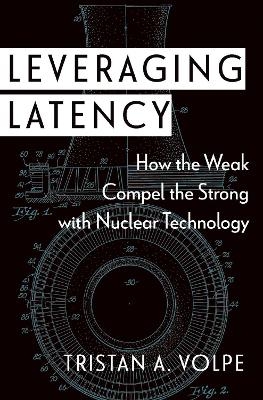
Leveraging Latency
How the Weak Compel the Strong with Nuclear Technology
Seiten
2023
Oxford University Press Inc (Verlag)
978-0-19-766953-2 (ISBN)
Oxford University Press Inc (Verlag)
978-0-19-766953-2 (ISBN)
Over the last seven decades, some states successfully leveraged the threat of acquiring atomic weapons to compel concessions from superpowers. For many others, however, this coercive gambit failed to work. When does nuclear latency--the technical capacity to build the bomb--enable states to pursue effective coercion?
In Leveraging Latency, Tristan A. Volpe argues that having greater capacity to build weaponry doesn't translate to greater coercive advantage. Volpe finds that there is a trade-off between threatening proliferation and promising nuclear restraint. States need just enough bomb-making capacity to threaten proliferation, but not so much that it becomes too difficult for them to offer nonproliferation assurances. The boundaries of this sweet spot align with the capacity to produce the fissile material at the heart of an atomic weapon.
To test this argument, Volpe includes comparative case studies of four countries that leveraged latency against superpowers: Japan, West Germany, North Korea, and Iran. In doing so, Volpe identifies a generalizable mechanism--the threat-assurance trade-off--that explains why more power often makes compellence less likely to work. This framework illuminates how technology shapes broader bargaining dynamics and helps to refine policy options for inhibiting the spread of nuclear weapons. As nuclear technology continues to cast a shadow over the global landscape, Leveraging Latency provides a systematic assessment of its coercive utility.
In Leveraging Latency, Tristan A. Volpe argues that having greater capacity to build weaponry doesn't translate to greater coercive advantage. Volpe finds that there is a trade-off between threatening proliferation and promising nuclear restraint. States need just enough bomb-making capacity to threaten proliferation, but not so much that it becomes too difficult for them to offer nonproliferation assurances. The boundaries of this sweet spot align with the capacity to produce the fissile material at the heart of an atomic weapon.
To test this argument, Volpe includes comparative case studies of four countries that leveraged latency against superpowers: Japan, West Germany, North Korea, and Iran. In doing so, Volpe identifies a generalizable mechanism--the threat-assurance trade-off--that explains why more power often makes compellence less likely to work. This framework illuminates how technology shapes broader bargaining dynamics and helps to refine policy options for inhibiting the spread of nuclear weapons. As nuclear technology continues to cast a shadow over the global landscape, Leveraging Latency provides a systematic assessment of its coercive utility.
Tristan A. Volpe is Assistant Professor in the Defense Analysis Department of the Naval Postgraduate School. He is also a Nonresident Fellow in the Nuclear Policy Program at the Carnegie Endowment for International Peace.
Chapter 1: Introduction
Chapter 2: A Theory of Compellence with Nuclear Latency
Chapter 3: Japan
Chapter 4: West Germany
Chapter 5: North Korea
Chapter 6: Iran
Chapter 7: Conclusion
Notes
References
Index
| Erscheinungsdatum | 01.02.2023 |
|---|---|
| Reihe/Serie | Disruptive Technology and International Security |
| Verlagsort | New York |
| Sprache | englisch |
| Maße | 236 x 165 mm |
| Gewicht | 517 g |
| Themenwelt | Sozialwissenschaften ► Politik / Verwaltung ► Europäische / Internationale Politik |
| Sozialwissenschaften ► Politik / Verwaltung ► Staat / Verwaltung | |
| Sozialwissenschaften ► Politik / Verwaltung ► Vergleichende Politikwissenschaften | |
| ISBN-10 | 0-19-766953-0 / 0197669530 |
| ISBN-13 | 978-0-19-766953-2 / 9780197669532 |
| Zustand | Neuware |
| Informationen gemäß Produktsicherheitsverordnung (GPSR) | |
| Haben Sie eine Frage zum Produkt? |
Mehr entdecken
aus dem Bereich
aus dem Bereich
Studienbuch
Buch | Hardcover (2023)
De Gruyter Oldenbourg (Verlag)
44,95 €
Amerikas Strategie der Vorherrschaft und der Kampf um Eurasien
Buch | Softcover (2024)
NOMEN Verlag
20,00 €
erfolgreiche Interessenvertretung durch Prozesskompetenz im komplexen …
Buch | Hardcover (2023)
Wiley-VCH (Verlag)
42,00 €


